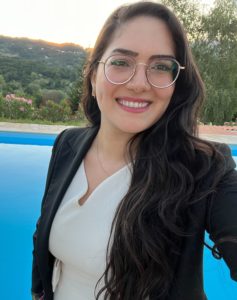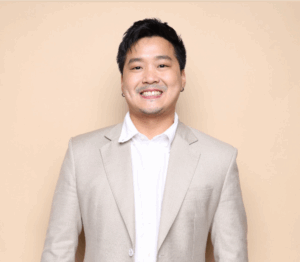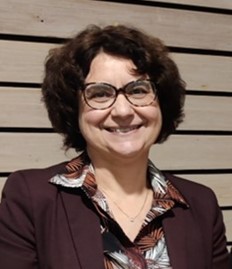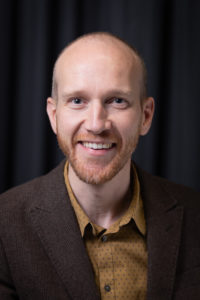Helical interfacial modulation for perovskite photovoltaics
Ghewa AlSabeh, Masaud Almalki, Sitthichok Kasemthaveechok, Marco A. Ruiz-Preciado, Hong Zhang, Nicolas Vanthuyne, Paul Zimmermann, Daphne M. Dekker, Felix Thomas Eickemeyer, Alexander Hinderhofer, Frank Schreiber, Shaik M. Zakeeruddin, Bruno Ehrler, Jeanne Crassous, Jovana V. Milić and Michael Grätzel
 |
Ghewa AlSabeh is a doctoral researcher at the Laboratory of Photonics and Interfaces at EPFL and the Adolphe Merkle Institute of the University of Fribourg in Switzerland since 2021. She obtained her MSc degree at the American University of Beirut in Lebanon in 2020 and joined the Smart Energy Mateirals team under the supervision of Prof. Jovana V. Milić and Prof. Michael Graetzel. Her research is focused on multifunctionality of layered perovskites and their light-induced transformations of in emerging technologies.
|
 |
Sitthichok (Chok) Kasemthaveechok, born and raised in Thailand. He obtained his PhD in 2021 under supervision of Dr. Jeanne Crassous and Dr. Ludovic Favereau. After his postdoctoral studies in Laboratoire d’électrochimie Moléculaire (LEM, Paris, 2022-23) with Dr. Niklas von Wolff and Institut of chemical research of Catalonia (ICIQ, Tarragona, 2023-24) with Dr. Mónica Pérez-Temprano. From 2024, he joined the eMOCA team in Institut Parisien de Chimie Moleculaire (IPCM- Sorbonne University) as CNRS researcher. His current research focuses on (asymmetric) electrosynthesis by supramolecular chemistry approach.
|
 |
Dr. Jeanne Crassous (born Costante) received her Ph.D. in 1996 under the supervision of Prof. André Collet (ENS Lyon, France), on the chirality of bromochlorofluoromethane. After a postdoctoral period in Prof. François Diederich’s group (ETH Zurich, Switzerland) studying the chirality of fullerenes, she received a CNRS researcher position, in Lyon then in Rennes (ISCR, University of Rennes, France), where she is currently a CNRS Research Director. Her group is dealing with chirality: organometallic and heteroatomic helicenes, fundamental aspects of chirality such as parity violation effects, electronic and vibrational circular dichroism, circularly polarized luminescence, magnetochirality and spintronics. |
 |
Bruno Ehrler is leading the Hybrid Solar Cells group at AMOLF in Amsterdam since 2014 and is also a honorary professor at the University of Groningen since 2020. Since 2024 he is the head of LMPV-Sustainable Energy Materials Department. His group focuses on perovskite materials science, both on the fundamental level, and for device applications. |
|
Jovana V. Milić has been Assistant Professor at the Adolphe Merkle Institute of the University of Fribourg in Switzerland since 2021, and Associate Professor at the Department of Chemistry of the University of Turku in Finland since 2024. She obtained her PhD in Chemistry at the Department of Chemistry and Applied Biosciences of ETH Zurich in 2017 and worked as a scientist in the Laboratory of Photonics and Interfaces at EPFL in Switzerland. Her research is centred around developing stimuli-responsive (supra)molecular materials for energy conversion, with a particular focus on halide perovskite materials and their application in photovoltaics and smart (nano)technologies. |
What aspect of your work are you most excited about at the moment?
Ghewa AlSabeh: I’m currently most excited about exploring ways to integrate smart molecules, specifically those responsive to light, heat, or pressure, into perovskite systems. This opens up promising pathways for creating multifunctional devices with tunable properties, which could be especially impactful in next-generation optoelectronic or sensing applications.
Sitthichok Kasemthaveechok: Right now, I desire to electrify chemical reaction. I want to turn it like we have done for most of things in our life from kitchen to transportation. But why chemical reaction still way difficult to electrify them? But I will try step by step, as electrochemistry is at the edge of homogeneous and heterogeneous system. I will need more experience about it to make the magic happen.
Jeanne Crassous: The role of chirality in fundamental physics and in optoelectronic/spintronic devices.
Jovana V. Milić: The use of stimuli-responsive molecular machineries in sustainable energy technologies.
How do you feel about Nanoscale Advances as a place to publish research on this topic?
Ghewa AlSabeh: Nanoscale Advances is an ideal platform for our work on perovskites with responsive functionalities. Its focus on innovative nanomaterials and broad visibility makes it a strong fit for sharing this research.
Jeanne Crassous: Appropriate journal to publish new results on devices and the fundamental phenomena at work.
Jovana V. Milić: Nanoscale Advances provides an excellent platform to publish research on emerging materials and their utility in optoelectronics.
Can you share one piece of career-related advice for early career scientists?
Ghewa AlSabeh: Always ask yourself “why” and aim to understand things as simply as possible. If you can explain your work to someone who is not from the field, you truly understand it. And remember: a PhD is a marathon, not a sprint. Pace yourself, stay curious, and don’t lose sight of the bigger picture.
Sitthichok Kasemthaveechok: I would say it is important to find the right group for you when choosing your PhD or postdoc positions.
Jeanne Crassous: Make experimental work and be trained to observe new phenomena. Be well-educated to understand the observed phenomena.
Jovana V. Milić: Follow your own path, you are best qualified to define the measures of your success.














